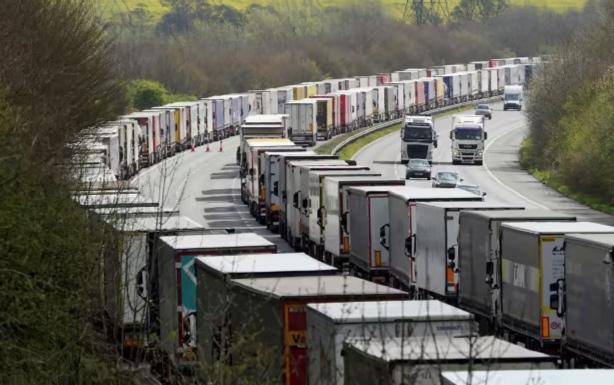
4 minute read
Transportation of fashion garments during crises
Description

Advertisement
The lesson explains the world in political instability and the world in crises. It focuses on the several recent transportation crises, the reasons they occurred, and how governments act to reduce their negative impacts. It also explains the importance of citizens’ active participation in political life. Critical thinking about all the events that concern us and affect our lives, going to the polls, and voting is the duty of every citizen. Because when a crisis arises, or in times of political instability, the politicians we voted for decide our quality of life.
Objective
Objective of this lesson is to explore numerous ways that political instability in some countries are causing problems in a supply chain for both buyers and producers. Learners will become aware that sustainability comes with political stability.
After this lesson you will be able to
- understand the connection between political stability and supply chain
- understand the importance of active involvement in the society
- explain the importance of citizens’ responsible votes
Tools and materials internet, TV and daily newspapers
TRANSPORTATION DISRUPTIONS:
The term “transportation disruption” means any significant delay, interruption, or stoppage in the flow of trade caused by a natural disaster, heightened threat level, an act of terrorism, or any transportation security incident.
(Cornell Law School)
REGULATORY POLICIES:
Regulatory policy is about achieving the government’s objectives through the use of regulations, laws, and other instruments to deliver better economic and social outcomes and thus enhance the life of citizens and business.
(OECD)
Why does politics matter? Why should young people care about politics?And what does politics have to do with fashion industries?
In simple words, politics matter. Politics affect our lives on a daily basis. The governments we elect make decisions that impact our lives. Paying attention to their work and being informed helps us clarify our opinions. When it comes to new elections, every citizen’s vote matters; your vote matters because this is the way you can stand up for what you believe in. You have probably heard the term ‘political instability’ many times. But do you know what it means?
Political instability occurs when there is a potential for sudden and significant change in a nation’s leadership and policies, events like terrorism, civil unrest, and strikes. When a country enters a state of political unrest from any of these incidents, international businesses with supply chains of the country are impacted in a negative way.
Over the past two years, we have all witnessed several new crises, from the COVID-19 pandemic to the recent Russian aggression on Ukraine. Regarding the fashion industry globally, those crises disrupted the supply chains of the textile, apparel, and fashion manufacturing industry in various and unprecedented ways.
Since our topic is transportation in the fashion industry, we will shortly explain two recent events/crises where the transportation of goods was endangered.
The global supply chain, from raw materials to finished products, is maintained through an extensive network of freight transport services, including all modes of transportation.
Pandemics, and Brexit are having a significant disruptive impact on European and global transportation of goods and mobility in general.
We remember shipping delays during the lockdown. A year ago, we slowly got used to the fact that the goods we ordered online would not arrive at our destination on time. No one could promise with certainty when to expect the shipment of purchased items.
In the world of political stability, the common causes of shipment delays are holidays, extreme weather, or inaccurate shipping information. But in the recent crises, the leading cause of shipment delays are supply chain issues and labour shortages.
A global pandemic, war conflict, and port delays have caused worldwide supply chain problems. As a McKinsey article says:
“Clogged ports, expensive cargo capacity, and emergency shipments became prevalent during the COVID-19 pandemic. Since then, the conflict in Ukraine has also contributed to product-line closures, transport delays, and spiralling input costs.”
How are government’s actions reducing the impact of these crises?
There are specific rules and regulations in the transportation of goods, agreed upon internationally or bilateral, between two countries.
In times of crisis, state governments work differently. They reorganise and relax some standards and regulations to help the supply chain remain as fluent and operational as possible. The political measures are agreed to help reduce economic damages to producers and traders.

Here are some examples on how governments acted in the recent transportation crises:
• Pandemics
To ensure the quick and continuous flow of goods across the EU, the European Commission issued, on 23 March 2020, practical advice on the implementation of˜green lanes. Green lanes mean border crossings open to all freight vehicles carrying goods where any checks or health screenings should take no more than 15 minutes. It includes guidance on how to keep freight moving across the EU during the pandemic. The package of regulations follows action taken to ensure the safety of transport workers, keep travellers informed about their rights and ensure the circulation of essential goods across Europe.
• Brexit
Statistics say that before Brexit, over 4.4 million freight vehicles moved between the EU and the UK annually, with 4 million going through the Port of Dover alone. The UK left the EU on January 31, 2020. and the leaving date could not have come at a possibly worse time, as COVID-19 began dampening the global economy. One of the consequences of the pandemic-forced stoppage in transportation activity is that some drivers close to retirement or working in the industry for several years have decided to leave their profession behind and exchange their truck driving careers for prospects elsewhere. As such, the pandemic worsened the driver shortage across Europe. Yet the United Kingdom faced an unprecedented crisis since Brexit was also the catalyst for many drivers to leave the country for jobs within the EU.
Transport movements between the EU and the UK have become more complicated. There are more customs formalities and longer waits. The new situation particularly affects just-in-time deliveries and perishable goods transports. Lots of work for governments, NGOs and citizens.


